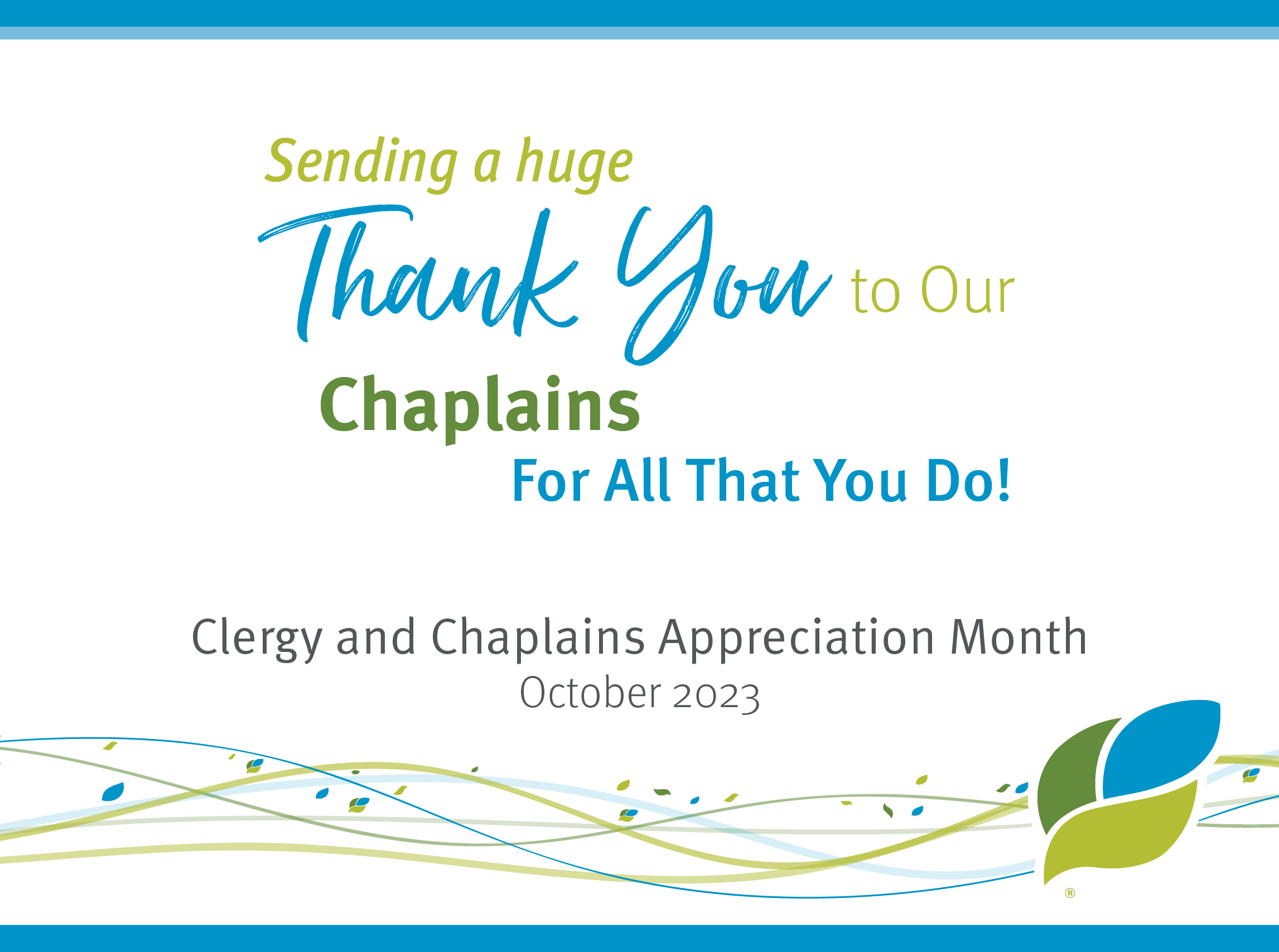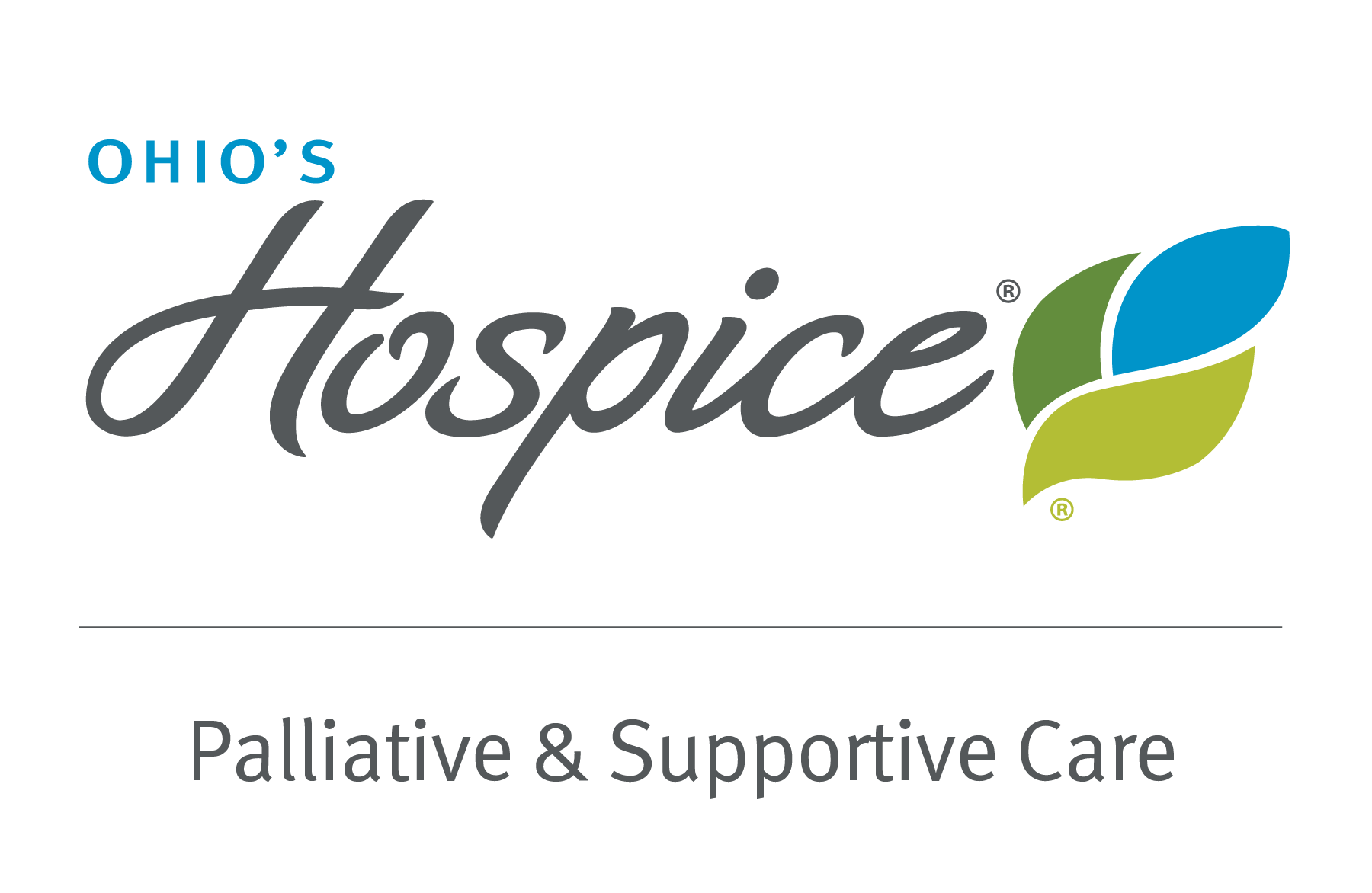Celebrating Clergy and Chaplains Appreciation Month
Chaplains Make a Difference in the Lives of Our Patients and Families
This October, we are celebrating and recognizing our chaplains during Clergy and Chaplains Appreciation Month and on Oct. 8, Clergy Appreciation Day. We’re grateful for the care they provide to our patients and families. We thank them for all they do to support our mission as they make a difference in the lives of our patients and families each and every day.

As part of our interdisciplinary care team, our chaplains provide spiritual counseling and support that respects our patients’ and families’ religious and non-religious needs. They personalize their care to meet our patients where they are on their spiritual journey.
Importance of Listening
Mark Pierce, one of our chaplains, listens to patients, creating a safe space for them to share their stories, reflect on their feelings, and explore what is meaningful to them.
“As a chaplain, I see myself as one among many who go to where the person lives and sits with them,” he said. “I feel that it is my role and passion, instead of moving away from the person, to move closer, that is, to listen. I do not come with an agenda. The person is almost always exhausted, tired, and weary and, in a number of cases, simply wants someone to be there with them and for them. I believe that most people want to be heard.”
Interfaith Ministry
Our chaplains do not impose their belief system on patients and families. They are grounded in their various faiths and have clinical training in diverse settings that respect religious and non-religious belief systems. Ed Ellis, one of our chaplain coordinators, believes that honoring many different spiritual practices is both an opportunity and responsibility of a chaplain who commits oneself to an interfaith ministry.
“Equipping oneself with an educated appreciation for many different cultures and religious traditions translates to an important respect,” he said. “This in turn honors the welcome we receive into the many different homes and lives of those we serve. There is also much to be learned from those who serve in leadership roles in the many different religious and spiritual communities both within and beyond the communities we are honored and privileged to serve.”
Personalized Care
Teresa McClennon, one of our chaplains, explained that she personalizes her care for the patient and their beliefs. Her training has helped her to identify points of connections as the patients and families share their story. She provides a nonjudgmental presence.
“I am witness to their journey, and I utilize their faith, beliefs, or those things that provide them with meaning and purpose to support them on their journey,” she said. “I listen, facilitate a safe place to share, and help others assess their own resources so they can better cope with their crisis.”
Spiritual Care
Ellis explained that patients and families facing end-of-life care have strong foundational needs to be supported in their exploration and practice of spiritual well-being. Accompanying others along a path that leads to peace is a rewarding journey.
“All of us are created as precious expressions of the life we share. Our value as individuals and through the relationships we share makes us unique and a part of the whole of who we are as a united human community,” Ellis said. “Spiritual care honors each person through imparting an appreciation for what is contributed through individualized care and honor.”
Spiritual Care for Those With Dementia
Pierce said that it is important to support patients by affirming, validating and journeying with them, and discovering those aspects that have given the person a sense of meaning. He has a special place in his heart for those who have dementia.
“They are often discounted or ignored. Some would say that they have no spiritual needs at all,” Pierce said. “In my view, their spiritual needs are heightened. They have something to say and questions to ask — sometimes multiple times in a short span of time. They are desperately trying to recall and hang on to the memories that have become so elusive.”
Pierce meets the individual where they are in that moment and offers an anchor or a lifeline. “I listen for clues as to who this person is and who they will always be even if the person cannot remember,” he said. “I often sing to the individuals for whom I care. I never cease to be amazed at how quickly the person recalls the words to the hymns, how they smile, and how their head bobs up and down as they emphasize the words that they sing with me.”
Struggling With Forgiveness and Saying Goodbye
Some patients struggle with forgiveness or saying goodbye to relationships, roles or identities. When this happens, our chaplains assist with the forgiveness of the patient or others, and they provide support in saying goodbye and letting go through the end of life.
Karen Fox, one of our chaplains, explained that she identifies the cause of spiritual pain. “I navigate through the patient’s emotional needs to determine what is the best approach to establishing peace for the situation,” she said. “I validate their thoughts and feelings, and I affirm their understanding of their mindset.”
Pierce reminds patients that they are loved. If they the individual is a person of faith, he reads or recites encouraging and hopeful Scripture passages from the Bible, which are consistent with the person’s faith tradition. He sings comforting and familiar hymns of the faith or plays their favorite music on his cell phone.
“As death approaches, family is ordinarily present and at the bedside,” he said. “I let the patient’s friends and family members know that it is OK to tell the person that ‘we love you, it’s OK to go, you have taught us well, we will not forget you, we will be OK.’”
Called to Serve
Many of our chaplains feel called to serve as a chaplain. They are dedicated to helping patients and families through spiritual counseling and support.
Fox believes in living with the attitude of altruism. “Giving of myself to others who are suffering and in spiritual pain is important to me because I can and do make a difference in patients’ lives,” she said. “I can discern and assist with the emotional needs of the patients.”
As a clergy woman, she has been taught to love all people unconditionally. “I am open, friendly, kind, and compassionate to the needs of others,” she said. “God is who drew me to this career path.”
McClennon started out as a chaplain candidate in the U.S. Army. After a knee injury, her path led her to the Cincinnati Veterans Affairs Medical Center, where she enrolled into the Clinical Pastoral Education program.
While serving there, she rotated in various areas. She cared for a patient who was facing a life-limiting illness and needed comfort care. “I’ve served in hospice care since that moment,” she said.
Making a Difference
Our chaplains are dedicated to making a difference in the lives of the patients and families to whom they provide spiritual support.
“When individuals are dying, they want someone to listen to them. They want to tell their stories. They want to find some measure of healing from wounds received and/or inflicted, and they want to know that their life has made a difference while living on this earth,” Pierce said. “I want to be there to hear their stories. I want to know that when I reach the end of my journey that I have made a difference.”
How to Reach a Chaplain
To reach a chaplain, call 800.653.4490 or click here for more information.

